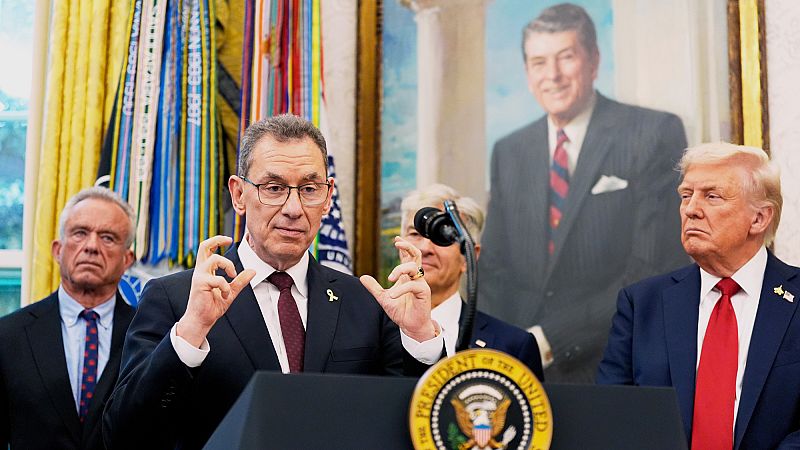Pfizer agrees to lower prescription drug costs for Medicaid

Pfizer has agreed to lower the cost of prescription drugs for Medicaid under a deal struck with the Trump administration, President Donald Trump said on Tuesday, as he promised similar deals with other drugmakers under the threat of tariffs.
Trump made the announcement at the White House alongside Pfizer CEO Albert Bourla just hours ahead of a government shutdown in a partisan standoff over healthcare and spending.
Pfizer, one of the largest US drugmakers, produces the COVID-19 vaccine Comirnaty and the treatment Paxlovid. Its products also include several cancer drugs, the blood thinner Eliquis, and Prevnar pneumonia vaccines.
Under the deal, New York-based Pfizer will charge most-favoured-nation pricing to Medicaid and guarantee that pricing on newly launched drugs, Trump said. That involves matching the lowest price offered in other developed nations.
Pfizer also agreed to participate in a new website the administration plans to start called TrumpRx, which will allow people to buy drugs directly from manufacturers. Pfizer said many of its treatments will be offered at discounts that average 50% through that platform.
Extent of cost changes not yet clear
The agreement builds on an executive order Trump signed in May, setting a deadline for drugmakers to electively lower prices or face new limits on what the government will pay. Trump said deals with other drug companies would be coming over the next week.
“I can’t tell you how big this is,” the president said Tuesday.
“We are turning the tide and we are reversing an unfair situation,” Bourla said.
But prescription drug pricing expert Stacie Dusetzina said the extent of the possible cost changes aren’t yet clear. The Vanderbilt University Medical Center professor noted that Pfizer is keeping specific terms of the deal confidential, and it wasn't clear how different any new pricing levels will be from what Medicaid already pays Pfizer.
Consumers are not expected to start seeing lower prices under the Pfizer deal until 2026, according to senior administration officials who were not authorised to speak publicly and spoke on condition of anonymity.
Patients in Medicaid, the state and federally funded program for people with low incomes, already pay a nominal co-payment of a few dollars to fill their prescriptions, but lower prices could help state budgets that fund the programs.
Lower drug prices will also help patients who have no insurance coverage and little leverage to negotiate better deals on what they pay. But even steep discounts of 50% found through the administration's website could still leave patients paying hundreds of dollars a month for some prescriptions.
Drugmakers in the past couple of years have started launching websites to connect customers directly with some products, such as obesity treatments or the blood thinner Eliquis.
But Dusetzina said selling drugs like that directly to consumers will help only a small number of people.
“Theoretically there are some who will benefit, but in general this is not a solution for lowering drug prices,” she said.
Investment in domestic manufacturing
Besides committing to lowering costs, Trump said Pfizer agreed to spend $70 billion (€60bn) in domestic manufacturing facilities, becoming the latest in a string of major drugmakers to announce plans to build production in the United States.
The White House did not immediately release details about the investment, but Pfizer said in a statement that the outlay would be dedicated to US research, development and capital projects in the next few years.
Trump has been talking for months about the need to lower drug prices and to boost US drug manufacturing. To persuade companies to strike deals, Trump said he threatened to impose tariffs — a favourite tool of his — but that move could raise drug prices.
Trump said the tariff threat put the government in “a pretty good negotiating position” and added: “This is something that most people said was not doable.”
One thing that is not doable, however, was Trump’s repeated claim that it would cut drug prices by more than 100%. “14, 15, 1,600% reductions in some cases,” he said.
A 100% reduction would make the drugs free. Cuts greater than that would essentially mean people are paid to take the drugs.
Trump sent letters in late July to executives at 17 pharmaceutical companies about changes he would like to see. Copies of the letters posted on social media note that US prices for brand-name drugs can be up to three times higher than averages elsewhere.
The letters called for drugmakers to commit by Monday to offering what Pfizer agreed to: most-favoured-nation pricing to Medicaid and new medications.
Trump also asked drugmakers to offer the lower pricing levels for drugs sold directly to consumers and businesses.
Trump has claimed that the US, with its higher drug prices, subsidises care in other countries.
Drug prices for patients in the US can depend on a number of factors, including the competition a treatment faces and insurance coverage. Most people have coverage through work, the individual insurance market or government programs like Medicaid and Medicare, which shield them from much of the cost.
Today

